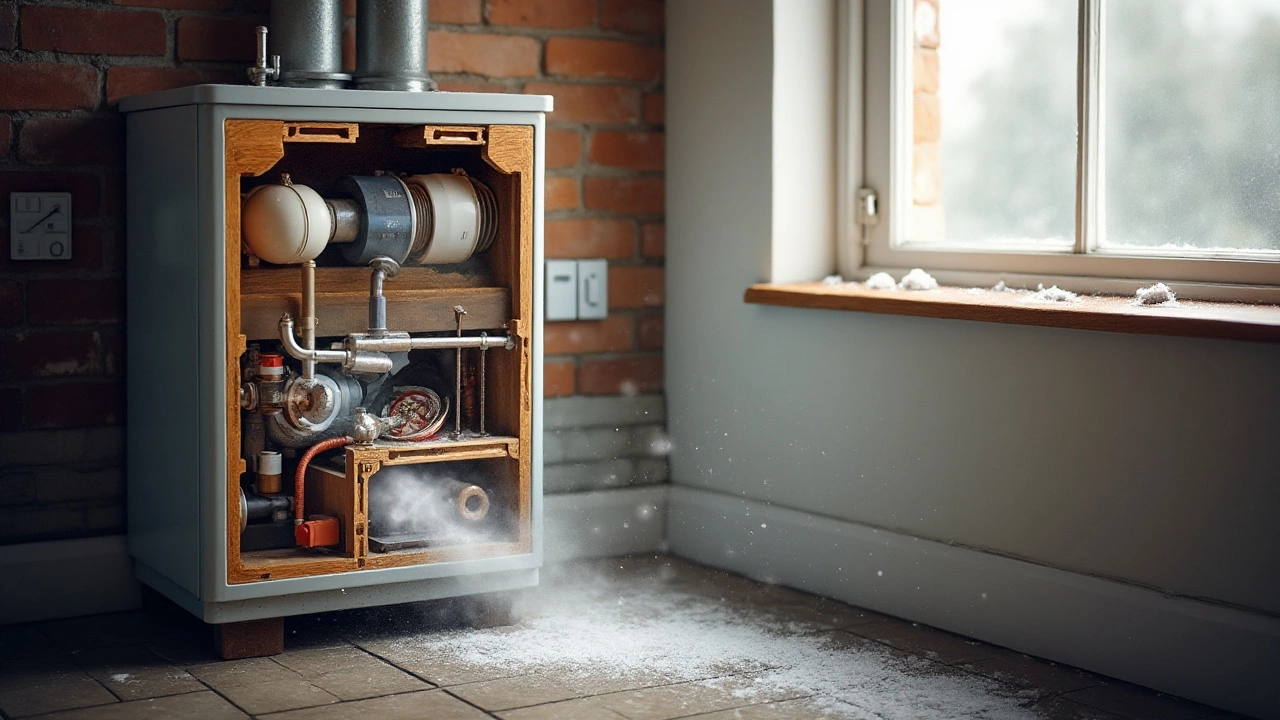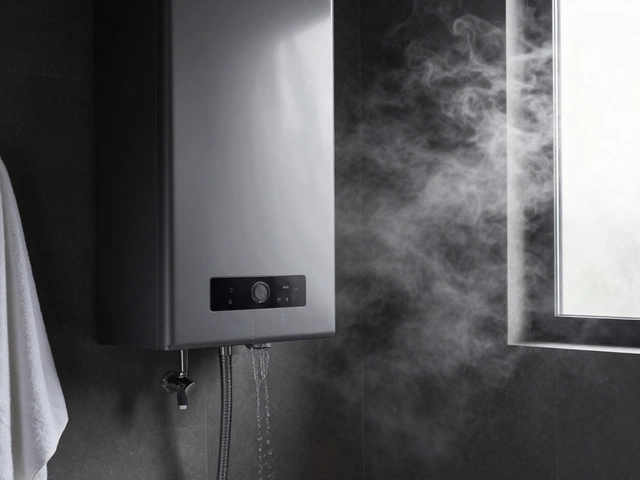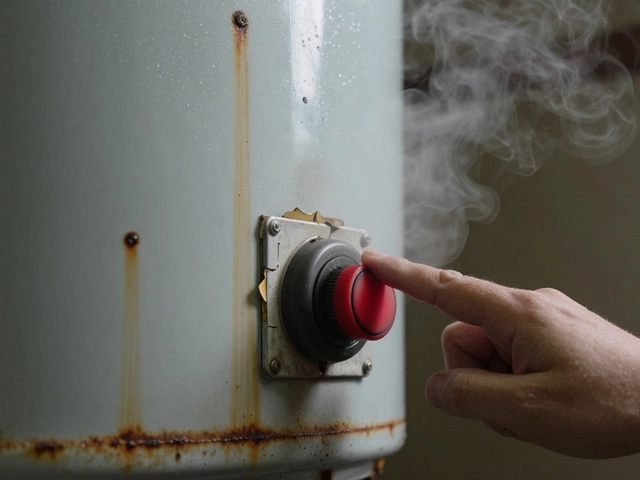Boilers are the unsung heroes of our homes, quietly working away to keep us warm and comfortable. But what happens when they falter or fail? As winter sets in, the thought of a broken boiler can send shivers down the spine of any homeowner. The good news is that most common boiler issues can be identified and resolved, often without the need to panic.
In this article, we dive into the world of boilers, exploring the typical problems you might encounter, how to spot them, and what steps you can take to correct these issues. Whether you’re dealing with mysterious noises, inconsistent heating, or the dreaded leak, we’ve got you covered with practical advice to help you get your system back on track.
- Recognizing Signs of Boiler Trouble
- Common Causes of Boiler Malfunctions
- DIY Tips for Quick Boiler Fixes
- When to Call a Professional
- Preventive Maintenance Practices
- Energy Efficiency and Upgrading
Recognizing Signs of Boiler Trouble
Knowing the early warning signs of a boiler slipping into disrepair can save you more than just time; it can save you from a freezing cold shower on a snowy morning. One of the most tell-tale hints is merely paying attention to unusual noises emanating from the unit. Such sounds can vary from gurgling and whistling to outright banging. These sounds are often due to air trapped in the system, low water pressure, or a faulty pump. Interestingly, a British Gas survey noted that around 20% of homeowners ignore the initial sounds and end up facing bigger issues later.
Another major indicator is a sudden change in water temperature. If your water is scalding hot one minute and icy cold the next, it’s a sure sign that something is amiss. This temperature fluctuation can often be attributed to a problem with the thermostat or timers, or it could signal a deeper issue within your boiler's internal system. A constantly resetting pilot light is also a sugary crumb trail leading right back to a compromised boiler condition, often hinting at a malfunctioning thermocouple or a blocked burner.
Check your boiler’s pressure gauge: A clear indication of internal conditions, if the pressure lies below 1 bar, it's not giving you a hearty salute. Low pressure can lead to inefficient heating or a complete shutdown of the system. Similarly, excessive pressure can cause leaks or damage internal components. According to Energy Saving Trust, low pressure may suggest a water leak somewhere in the system or issues with the pressure relief valve.
Keep an eye on your boiler’s energy consumption too. If you notice your energy bills surging without a clear spike in usage, the boiler might be working overtime due to inefficiency, heralding a possible issue that needs addressing. Studies show that inefficient boilers may increase energy costs by over 30%, so it’s worth keeping tabs on any sudden expenses.
Moreover, visible leaks or puddles beneath your boiler are red flags. Water visibly escaping from the unit's housing could indicate internal connections failing or issues with the internal pressure. Any sign of leaking should ring the alarm bells straight away. Interestingly, according to a report by Which? on home services, 40% of boiler failures are due to leaks, mostly preventable with regular checks.
To extend your boiler’s lifespan, it's crucial to heed these early signs and act upon them. Engaging a professional for periodic maintenance can nip most issues in the bud before they grow into more expensive problems.
Common Causes of Boiler Malfunctions
Boilers are complex machines, and just like any other appliance, they can experience a variety of issues over time. Some of these problems may seem minor, but ignoring them can lead to significant trouble down the line. Understanding the **common causes of boiler malfunctions** can save you a lot of headaches during the colder months. One widespread issue stems from low boiler pressure. This can happen when water leaks out of the system, or when the radiator valves are left open. Without the correct pressure, your **heating** system won’t function effectively, leading to cold radiators and an unpredictable supply of hot water.
Another common culprit is a malfunctioning thermostat. Thermostats regulate the temperature, but if they're misreading the temperature or aren’t functioning correctly, your home can either feel uncomfortably cold or unnecessarily warm. It’s crucial to ensure they’re calibrated correctly. Sometimes, families overlook these devices, but like boilers, they need occasional care and replacement. In particular, older thermostats may not function efficiently in modern settings where energy efficiency is key.
A prevalent issue that does not seem to be fading any time soon is airlocks. These occur when air becomes trapped in the system, especially after an attempt at DIY maintenance like bleeding the radiators. This trapped air can stop water from circulating, causing radiators to remain cold despite the boiler seemingly working fine. Bleeding your radiators regularly can help avoid this issue. Additionally, sludge buildup inside the system is another cause of concern. Over time, rust and other debris can build up inside the boiler and pipes, hampering the flow of hot water. Regular power flushing can help prevent these blockages and keep your boiler running smoothly.
Remarkably, some boiler malfunctions originate from basic electrical problems. If your boiler is not turning on or keeps tripping the circuit breaker, it could be due to faulty wiring. Electrical components can degrade over time, particularly in older systems. This is one area where professional inspection is recommended, as tinkering with electrical parts can be hazardous. As a rule of thumb, ensuring your boiler’s electrical system is well-maintained will often prevent other complications.
"Preventive maintenance is crucial as boilers age. Keeping an eye on things like pressure, sludge, and airlocks can dramatically extend a boiler's lifespan," notes Dr. Sarah Elwell, an expert in home energy systems at the University of Illinois.
Lastly, a noisy boiler is often a good indicator that something is amiss. Gurgling, banging, or whistling sounds can point to limescale accumulation, especially in hard water areas. Limescale can build up on the heat exchanger, leading to inefficient heating and increased energy consumption. A magnetic filter can help alleviate this issue by capturing magnetic particles before they can settle and form damaging scale.
Understanding these common issues and their causes not only helps in preventing boiler problems but also arms homeowners with the knowledge needed to tackle them head-on, ensuring a safe, cozy home environment throughout the year.

DIY Tips for Quick Boiler Fixes
Troubleshooting your boiler doesn't always have to involve calling in the cavalry. With a little knowledge and some practical skills, many boiler issues can be resolved right at home. One of the first things to check when your boiler acts up is the pressure gauge. This vital component often tells the tale of what might be going wrong. A too-low pressure can mean inadequate heating, while high pressure might point to a potential leak in the system. Adjusting the pressure manually can sometimes do the trick. Locate the filling loop, usually a flexible hose beneath the boiler, and slowly open the valves to bring the pressure back to the recommended level of about 1.5 bars.
Another common problem is air in the heating system, leading to the dreaded cold radiators. Bleeding your radiators is a simple task that can drastically improve the efficiency of your heating system. A radiator key will usually do the job. Begin by turning off the heating and let the radiator cool slightly. Then, insert the key into the valve at the top and slowly turn it counterclockwise. You should hear a hissing sound as the trapped air escapes. Once water starts leaking out, tighten the valve and check the pressure again, as it might need re-adjusting.
Thermostat issues can also frequently disrupt your boiler's routine. Sometimes, the thermostat might not correctly communicate with the boiler, perhaps because it's in the wrong location or needs new batteries. Consider relocating it away from draughty spots or direct sunlight, and always ensure the settings are properly configured. A reading that's off by even a few degrees can block your boiler from firing up, leaving a chilly home as a result. On a cooler note, another simple fix involves resetting your boiler. Modern units often have a user-friendly reset button, which can resolve several glitchy problems. Refer to your manufacturer's guide for specific instructions, but generally, this involves pressing the button once and waiting a few minutes.
"Home repairs can save you time and money, but knowing limitations is crucial for safety," advises John Smith from HomeHeaters Inc.
Water leaks, often signaled by damp patches or a drop in pressure, require immediate attention. While DIY solutions may involve tightening joints or using a heat-resistant sealant, more complicated scenarios call for a professional touch. Always turn off the electricity supply before attempting any fixes to prevent any hazards. Knowing when to seek professional help reduces the risk of causing further damage, which might be more costly and dangerous. Safety should always take precedence when dealing with any household appliance.
Looking at maintenance from a proactive stance is another great strategy. Regularly cleaning any visible filters or heat exchangers can extend the lifespan of your boiler and keep it running smoothly. Many modern boilers have indicator lights or symbols that flash when an issue arises, so familiarizing yourself with these signals can prevent minor problems from morphing into major headaches. With a balanced mix of DIY knowledge and professional insight, tackling boiler repair issues becomes less intimidating, enabling you to enjoy a cozy, warm home year-round.
When to Call a Professional
Sometimes, despite our best efforts, a boiler’s problems go beyond what a handy homeowner can handle. Knowing when to call in the experts isn’t just about saving your own time; it’s about ensuring safety and efficiency. If you encounter unfamiliar noises like banging or consistent rattling, it might be more than simple air in the pipes. Such sounds could indicate significant mechanical issues that a professional can diagnose and fix safely.
Leaks in the boiler system are another critical sign. It may start as a small puddle, but it can quickly escalate into water damage or electrical hazards. While tightening a valve might seem straightforward, leaks might stem from pipe corrosion or faulty connections that require professional seals and repairs. Always remember, a leak’s origin might be hidden from view, concealed in parts of the system that need a trained eye to explore.
Here’s a simple rule: if your boiler tells you something’s wrong via an error code, heed its warning. Modern boilers come equipped with diagnostic tools and error codes that can reveal a lot. However, translating a cryptic ‘E-2’ message into action often requires specialized knowledge. It doesn’t just translate into pressing a button; it might mean resetting parts or replacing components.
“Boilers are like the heart of a home's heating system. When they break down, it can feel catastrophic, like a blizzard in your living room. That’s when you need a pro to restore the warmth,” says Dana Roberts, a seasoned HVAC professional with over two decades of experience.
The complexity of the heating system is another thing to consider. Boilers interact with other parts of your heating system, including radiators, thermostats, and pipe networks. When any part of this complex network fails, it can take down the entire system with it. Trained professionals have the tools and knowledge to ensure each component works in harmony to get things back to normal.
Cost considerations might tempt you to postpone a professional visit. But procrastination can lead to greater expenses if left unchecked. Regular servicing can enhance efficiency and promote energy conservation which, over time, could lead to substantial savings on energy costs. Professional intervention in time is often far cheaper than ongoing inefficiencies or catastrophic failures that never came on your radar.
For persistent boiler pressure issues, whether it's consistently low or high, professional intervention is often necessary. The underlying issues may be pressure release valve faults or even system contamination, like sludge or limescale, requiring a professional-grade flush. Addressing these without the right tools or expertise might only worsen the issue.
If you’re ever in doubt about the state of your boiler, it’s best to lean on a professional's wisdom. Peace of mind comes from knowing that you’re not just making a temporary fix, but ensuring that your heating system is safe and ready to keep your home comfortable throughout the colder months. So at the end of the day, when it comes to the dependable operation of your home’s boiler repair and maintenance, don’t be hesitant to bring in the experts.

Preventive Maintenance Practices
Proper maintenance is the backbone of any well-functioning boiler system. It’s not just about avoiding interruptions to your home’s warmth, but also ensuring cost-efficiency and longevity of the unit. Regularly scheduled maintenance can significantly reduce the occurrence of common boiler issues. By giving a little extra attention and care to your heating system, you can prevent costly repairs in the long run. Start by scheduling an annual service with a qualified technician. An expert can spot issues in their infancy, long before they manifest into more serious problems.
Consider taking matters into your own hands, too, with a few simple tasks you can perform yourself. Begin with checking your boiler’s pressure gauge regularly. A healthy boiler pressure typically hovers between 1 and 2 bar, and keeping an eye on this can prevent low-pressure issues. Another vital task is bleeding your radiators from time to time. Air trapped inside can reduce efficiency and heating output, though releasing it is a relatively simple process. Always make sure to reseal your valves tightly.
"Preventive maintenance is key to maximizing the efficiency and life span of your boiler," explains James Harrison, a veteran heating engineer. "No one wants to wake up to an icy morning only to find their boiler has given up the ghost overnight."
Cleaning is another crucial aspect of boiler maintenance. Dust and debris can accumulate over time, potentially blocking the burning chamber or clogging filters. Check these components periodically and ensure they're free from obstructions. For those tackling this at home, make sure to follow safety precautions, such as turning off the power and letting the boiler cool completely. While doing this, inspect the flue and external vents for blockages, especially if your setup is exposed to outdoor elements. Birds and rodents can occasionally find these spaces ideal for nests, which in turn could lead to dangerous blockages.
In addition to regular checkups, monitoring your heating system for unusual noises or leaks can provide early warnings of underlying problems. If you notice loud banging, known as ‘kettling’, or an unexpected drip, it’s wise to consult a professional immediately. Consistent engagement with your boiler's health is comparable to regularly taking your vehicle in for tune-ups and oil changes – it keeps things running smoothly and efficiently. Finally, never underestimate the power of good insulation and a well-sealed home. Addressing draft issues and ensuring that your home retains heat optimally supports your boiler in maintaining its efficiency with less strain.
Implementing Seasonal Adjustments
Adjusting the settings of your boiler according to the seasons is another savvy practice. Many modern boilers come with weather compensation settings or smart thermostats. During warmer months, reducing the heating output conserves energy. As the temperature drops, gradually increase it to find the balance between comfort and economy. Remember, it's crucial to switch your system off or to a lower setting when away for extended periods. This not only saves energy but prevents unnecessary wear.
Embracing these self-maintenance tips not only helps you avoid reaching the point of needing costly boiler repair, but also empowers you as a homeowner. Maintaining knowledge and an active role in your boiler's health can lead to peace of mind during those chilly months when your boiler’s performance is most critical. As the old saying goes, an ounce of prevention is worth a pound of cure.
Energy Efficiency and Upgrading
In an era where energy efficiency is no longer viewed as a luxury but rather a necessity, upgrading your boiler system can significantly impact both your energy bills and environmental footprint. Many older boilers operate at only 50-70% efficiency, meaning a large portion of the energy they consume is wasted. Today's high-efficiency boilers can exceed 90% efficiency, converting almost all the fuel they use into heat. Such upgrades not only reduce your energy consumption but also lessen greenhouse gas emissions, making it a win-win for both your wallet and the planet.
When considering an upgrade, one important step is to conduct an energy audit of your home. This assessment provides valuable insights into your energy use patterns, helping identify where improvements can make the biggest impact. A common recommendation from energy auditors is to replace aging boilers with modern models that feature condensing technology. These boilers utilize a second heat exchanger to capture a portion of the energy that would escape out of the flue in older models, further boosting efficiency. Investing in a smart thermostat can also optimize your heating schedule, allowing you to control temperatures remotely based on your actual needs.
To illustrate the potential benefits of upgrading, consider this: If you swap out a boiler that operates at 70% efficiency with a new 90% efficient model, you could see a reduction in annual heating costs of up to 27%. This is substantiated by a study from the Energy Saving Trust, which observed similar savings across various households. Not only does this translate into significant financial savings, but it also contributes to a reduced carbon footprint, bringing you a step closer to sustainable living.
In some cases, upgrading your boiler might also mean moving the entire setup to a more strategic location within your home, which can further enhance efficiency. Engineers often suggest placing boilers in centralized locations to reduce the length of pipe runs, which minimizes heat loss. Additionally, updating your radiators and valves to more efficient models can further improve the way heat is distributed throughout your home.
"The cheapest and cleanest energy is the energy we do not use," says Jennifer Granholm, U.S. Secretary of Energy, emphasizing the importance of energy efficiency practices.
One can't overlook the role of government incentives and rebates that often accompany the installation of energy-efficient appliances. Many jurisdictions provide financial incentives for homeowners who choose to upgrade to more eco-friendly options, which can significantly offset the initial cost. Taking advantage of these programs can make the transition to a more efficient boiler smoother and more affordable.


